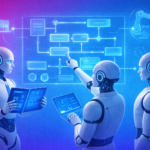The HR Revolution Driven by AI Agents
In 2025, the Human Resources (HR) landscape is undergoing a profound transformation. What was once a department heavily reliant on manual processes, repetitive tasks, and administrative burden is rapidly evolving into a strategic powerhouse, thanks to the integration of AI agents for HR. These intelligent, autonomous systems are fundamentally reshaping how organizations manage their most valuable asset – their people. Beyond simple automation, AI agents are bringing unprecedented levels of efficiency, personalization, and insight to critical HR functions, from attracting talent to fostering a thriving employee experience.
This shift is not merely about adopting new tools; it’s about redefining HR’s role. By offloading routine and data-intensive tasks to AI, HR professionals are freed to focus on strategic initiatives like talent development, culture building, and complex employee relations. This post will delve into how AI agents are specifically streamlining HR processes in 2025 across recruitment, onboarding, and employee engagement, demonstrating how they contribute to overall AI business operations in 2025.
Recruitment: AI Agents as Your Smart Talent Scout
The talent acquisition process is often lengthy, resource-intensive, and prone to human bias. AI agents are revolutionizing recruitment by making it faster, fairer, and more effective.
- Automated Candidate Sourcing and Screening: AI agents can scour vast databases, professional networks, and job boards to identify potential candidates whose skills and experience align perfectly with job requirements. They can then conduct initial screenings by analyzing resumes, cover letters, and even public profiles, shortlisting the most promising applicants. This significantly reduces the manual effort of reviewing thousands of applications.
- Intelligent Candidate Engagement: Forget generic email blasts. AI agents can engage with candidates in real-time through chatbots on career pages or messaging apps, answering FAQs about the role, company culture, and benefits. They can schedule interviews, send reminders, and even conduct preliminary aptitude assessments. This provides an immediate, personalized experience for applicants, improving the candidate journey.
- Bias Reduction: By analyzing objective data points and standardized criteria, AI agents can help mitigate unconscious biases often present in human screening processes. This leads to a more diverse and equitable talent pipeline.
- Predictive Analytics for Fit and Churn: Advanced AI agents can analyze data to predict a candidate’s potential for success in a role and their likelihood of long-term retention, allowing recruiters to make more informed hiring decisions.
As Forbes frequently highlights, AI is fundamentally changing the talent landscape, making recruitment more efficient and equitable.
Onboarding: Creating a Seamless Welcome Experience
The onboarding process is critical for new hire retention and productivity. AI agents ensure a smooth, personalized, and efficient transition for new employees.
- Automated Paperwork and Compliance: AI agents can guide new hires through the completion of necessary paperwork, tax forms, and compliance documents. They can pre-populate forms with available data, answer common questions about policies, and ensure all mandatory steps are completed accurately and on time.
- Personalized Information Delivery: Instead of overwhelming new hires with a deluge of information, AI agents can deliver relevant materials (e.g., team structures, project guidelines, software access instructions) in a staggered, personalized manner, based on the employee’s role, department, and learning pace.
- FAQ Support for New Hires: New employees often have countless questions. AI agents can act as 24/7 virtual assistants, providing instant answers to common queries about IT setup, team contacts, facility information, and initial HR policies, reducing the burden on HR and managers.
- Seamless IT and System Access: AI agents can automate the provisioning of necessary software licenses, system access, and equipment requests, ensuring new hires are productive from day one.
- Culture Integration Assistance: While human interaction remains paramount, AI agents can assist with culture integration by providing links to company values, employee resource groups, and internal social networks, helping new hires feel connected.
By automating these administrative and informational aspects, HR can focus on the human touchpoints that truly make a difference in a new employee’s experience.
Employee Engagement: Fostering a Productive and Satisfied Workforce
Employee engagement is a continuous process crucial for retention, productivity, and overall company performance. AI agents offer innovative ways to keep employees connected and supported.
- 24/7 HR Support and Policy Navigation: Employees can consult AI agents anytime for instant answers to questions about benefits, leave policies, internal training programs, and performance review processes. This easy access to information reduces frustration and improves employee self-service.
- Personalized Learning and Development: AI agents can recommend tailored learning paths, training modules, and skill-building resources based on an employee’s role, career goals, and identified skill gaps. They can track progress and remind employees of upcoming deadlines for certifications or training.
- Employee Feedback Collection and Analysis: AI agents can conduct pulse surveys, gather feedback on company initiatives, and analyze employee sentiment from various communication channels. This provides HR with real-time, actionable insights into employee morale, pain points, and areas for improvement.
- Wellness and Wellbeing Support: AI agents can offer resources for mental health, stress management, and physical wellbeing, or even initiate check-ins based on pre-defined triggers (e.g., after a challenging project completion).
- Internal Communication Enhancements: AI agents can help disseminate important company announcements, policy updates, and event invitations in a personalized and timely manner, ensuring employees receive relevant information without being overwhelmed.
- Performance Management Assistance: AI agents can assist managers with setting goals, tracking progress against KPIs, and even generating preliminary performance review summaries, freeing up manager time for more meaningful coaching conversations.
Salesforce consistently advocates for AI’s role in improving employee experiences and operational efficiency within the workplace.
Conclusion: Preparing HR for an AI-Powered Future
The integration of AI agents for HR is not just a technological upgrade; it’s a strategic imperative for businesses aiming to streamline processes, optimize talent management, and enhance employee experience in 2025. By offloading repetitive administrative tasks and providing intelligent support across recruitment, onboarding, and engagement, AI agents empower HR teams to transition from administrative facilitators to strategic business partners.
To effectively embrace and implement AI agents in your HR department, consider these key steps:
- Identify High-Volume, Repetitive Tasks: Pinpoint the HR processes that consume the most time and resources but offer limited strategic value. These are prime candidates for AI automation.
- Ensure Data Quality and Integration: AI agents thrive on data. Ensure your HRIS, ATS, and other systems are integrated, and your data is clean, consistent, and accessible.
- Choose a Scalable and Secure Platform: Select an AI HR solution that meets your security and compliance needs and can scale with your organization’s growth.
- Adopt a Phased Implementation: Start with a pilot project in a specific HR area (e.g., automating onboarding FAQs) to learn, refine, and demonstrate value before a broader rollout.
- Focus on Human-AI Collaboration: Position AI agents as tools that augment, rather than replace, human HR professionals. Train your HR team on how to leverage these agents for greater efficiency and strategic impact.
- Measure ROI and Continuously Optimize: Track key HR metrics (e.g., time-to-hire, employee retention, HR ticket deflection rates) to quantify the benefits and continuously refine your AI agent’s performance.
For a broader understanding of how AI agents are transforming all internal operations, refer to our comprehensive guide: AI Agents for Internal Business Operations.
By strategically implementing AI agents in 2025, HR departments can unlock unprecedented efficiency, create superior employee experiences, and become true drivers of business success.





